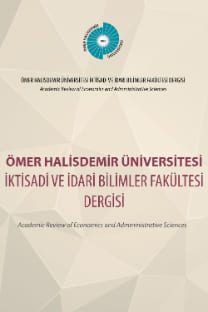ACADEMIC PROGRESS OF STUDENTS IN QUANTITATIVE COURSES AT NIGDE UNIVERSITY VOCATIONAL SCHOOL OF SOCIAL SCIENCES: A PREDICTION USING MARKOV MODEL
Sayısal Yöntemler, Ak ademik Performans, Geçiş Olasılık ları Matrisi, Mark ov Analizi
___
- Ma, X., & Kishor, N. (1997). Assessing the relationship between attitude toward mathematics and achievement in mathematics: A meta-analysis. Journal of Research in Mathematics Education, 28(1): 26-47.
- Taha H. A. (2000). Yöneylem Araştırması, 6.Baskıdan Çeviri, İstanbul: Literatür Yayıncılık.
- Anthony G. (2000). Factors influencing first-year students' success in mathematics, International Journal of Mathematical Education in Science & Technology, 31(1):3-14.
- Abu-Hilal, M. M. (2000). A structural model of attitudes toward school subjects, academic aspirations, and achievement. Educational Psychology, 20(1):75-84.
- Wainwright, P. (2006), Project Proposal: An Enrollment Retention Study Using A Markov Model For A Regional State University Campus In Transition, Indiana University
- Birch, E. & Miller, P. (2007). The Influence Of Type Of High School Attended On University Performance, Australian Economic Papers, 46(1):1-17
- Alawadhi, S. & Konsowa, M. (2010). Markov Chain Analysis and Student Academic Progress: An Empirical Comparative Study, Journal of Modern Applied Statistical Methods, 9(2):584-595.
- Ilgan A. (2013). Predicting College Student Achievement in Science Courses, Journal of Baltic Science Education, 12(3): 322-336
- Öztürk A. (2014). Yöneylem Araştırması, 15.Baskı, Bursa: Ekin Kitabevi Yayınları.
- Bluman A.G. (2014). Elemantary Statistics, 9th Ed.,New York: McGraw Hill Education.
- Farg, M. H. M. & Khalil, F. M. H. (2014). Statistical Analysis of Academic Level of Student in Quantitative Methods Courses by Using Chi-Square Test and Markov Chains - Case Study of Faculty of Sciences and Humanities (Thadiq), Nat Sci,12(12):182-186.
- Adeleke R.A., Oguntuase K.A., & Ogunsakin R.E. (2014). Application Of Markov Chain To The Assessment Of Students’ Admission And Academic Performance In Ekiti State University, International Journal Of Scientific & Technology Research 3(7):349-357
- galton.uchicago.edu/~lalley/Courses/312/MarkovChains.pdf, date retrieved: 11.12.2015
- dept.stat.lsa.umich.edu/~ionides/620/notes/markov_chains.pdf, date retrieved: 11.12.2015
- http://nigde.edu.tr/oidb/sayfa/yonergeler 27.02.2016
- http://www.nigde.edu.tr/oidb/sayfa/ogrenci-sayilari 28.02.2016
- ISSN: 2564-6931
- Yayın Aralığı: Yılda 4 Sayı
- Başlangıç: 2008
- Yayıncı: NİĞDE ÖMER HALİSDEMİR ÜNİVERSİTESİ
RELATION OF MARKETING AND PROFITIBALITY OF KAZAKHSTAN BANKS
İlhan EGE, Maya KATENOVA, Bulent DUMLUPINAR
PATERNALİST DEVLET ANLAYIŞININ BİR GEREĞİ OLARAK GÜNAH VERGİLERİ: TÜRKİYE ÖRNEĞİ
Selçuk BUYRUKOĞLU, Doğan BOZDOĞAN, Altuğ Murat KÖKTAŞ
ÇEVRE POLİTİKASININ EKONOMİK ARAÇLARI
TÜRKİYE’DE SAĞLIK HARCAMALARI VE BÜYÜME ARASINDAKİ İLİŞKİ ÜZERİNE BİR İNCELEME
ULUSLARARASI KONAKLAMA İŞLETMELERİNİN MİSYON İFADESİ BİLEŞENLERİNİN İNCELENMESİ: İÇERİK ANALİZİ
Oğuz DOĞAN, Nedim YÜZBAŞIOĞLU, Birsen ÇEVİK
Ayberk Nuri BERKMAN, Zeki DOĞAN, Fatma Nur YORGANCILAR, Seçkin ARSLAN
LOJİSTİĞİN EVRİMİ VE TÜRKİYE’DEKİ ÖNLİSANS VE LİSANS PROGRAMLARI YÖNÜNDEN LOJİSTİK ÖĞRETİMİ
Mehpare KARAHAN GÖKMEN, Fevzi Serkan ÖZDEMİR
KÜRESEL FİNANS KRİZİ SONRASINDA MERKEZ BANKACILIĞI VE TÜRKİYE CUMHURİYET MERKEZ BANKASI
Mehmet ŞENTÜRK, Selim KAYHAN, Tayfur BAYAT
